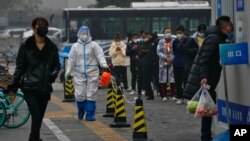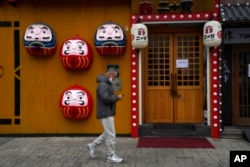A series of pointed questions about China’s zero-COVID policy attracted widespread attention on Chinese social media before being removed, reflecting growing frustration with repeated lockdowns and testing even as much of the world is returning to something resembling pre-pandemic normality.
Among the sources of frustration is the sight on television of tightly packed World Cup football stadiums with hardly a face mask to be seen.
“More than 120 countries in the rest of the world have lifted their COVID restrictive measures quite some time ago,” began one of the questions posed by a writer who said he lives in north-central Shannxi province, home to the ancient capital Xian.
“Why should they lead freer lives than Chinese citizens?" the questioner said. "I did not see anyone sporting face masks at the Qatar World Cup opening ceremony and did not hear of any attendee showing proof of negative COVID tests; does this mean they live on a different planet from us?”
The list of questions appeared Tuesday under the username Changan Ketang, who described himself as “shengdou xiaomin,” roughly translated as “one who lives between more or less rice,” or, in American English, “one who lives from paycheck to paycheck.”
Scientific 'yardsticks'
Another question hinted at dissatisfaction of public health authorities not doing enough to inform the public of treatment plans. Another concerned the effectiveness of the Chinese-made vaccines that have been administered to much of the public.
“What are the yardsticks for lifting COVID control?” said another of the questions. “If there aren’t scientific yardsticks, are we simply sticking to ‘control’ without end? What is the basis of our COVID prevention and control policy, after all?”
During its brief life online, the posting inspired a flurry of supportive comments from across China. One comment saying the “10 Questions” should be applauded received 18,000 “likes” on Weixin, a Chinese social media app. Another commenter received more than 9,500 “likes” for a posting that said, “Allow me to add an 11th question ahead of time: Why [are you/the authorities] bent on deleting this post?”
A netizen from Guangdong suggested the author should open a pay reward channel, a mechanism by which authors of online posts can receive money from those who appreciate their posts. The author, Changan Ketang, replied: “Reposting is better than sending me money.”
One day after the “10 Questions” post appeared, a writer using the name Mingshu posted a 6,000-word essay on the website of Phoenix New Media, headquartered in Beijing, dismissing Changan Ketang as uninformed and largely ignorant about the logic behind the government’s zero-COVID strategy.
Mingshu, whose profile was “deleted by the author” when VOA clicked on his name, argued in what appeared to be an official response to the original posting that the policy is necessary because China’s public health infrastructure is less developed than that of the United States, and that zero-COVID protects the old and the young from a deadly disease.
Mingshu did acknowledge that “10 Questions” had drawn attention to the stringent measures in place across China and attributed its popularity to “people getting tired of” zero-COVID measures insisted on by the government.
As of Friday morning, that posting had also been deleted. Users clicking on a link to Mingshu’s 6,000-word response to the 10 Questions found a message saying, “The item you are looking for has gone with the wind.” That notification was later replaced by a more standard “Sorry – We cannot find the page you requested.”
Another posting
Very quickly, however, Chinese social media users began clicking on another viral posting, this one a video showing a young man, reportedly from Chongqing, demanding accountability from the government. It quickly received more than 1 million views on the internet.
In the video, the man, wearing a dark gray T-shirt and eyeglasses and carrying a backpack, waves his hands and addresses a group of onlookers about the soaring price of carrots, currently selling in China for 8 renminbi – about $1.12 – for a 500-gram measurement known as a jin.
“Can you all please tell me how much carrots used to cost?” the young man asks. The onlookers reply, “Two, two and a half RMB.”
“Right! At most 4 RMB!” the young man says. He then shows a popular online grocery delivery app that sold carrots at 16.9 RMB per jin.
“Such prices are a piece of cake for the wealthy, but what about ordinary people?” he asks. “Seventy percent of people in our country earn less than 3,000 RMB a month. Let me tell you: There’s but one disease in this world – that is the lack of freedom combined with poverty. That’s where we are today!”
The man also complains that Chinese authorities, who insist they have handled inflation better than the United States and other countries, have in fact mishandled the problem and refuse to own up to their errors.
“Why can’t they follow the example of Zhuge Liang [a famous third-century military strategist], and acknowledge their mistake? Zhuge Liang lowered his own rank by three steps when the army, guided by his advice, lost a battle!”
Promptly dubbed “Chongqing Superman” because of the Superman backpack he was carrying, the man also says, before being dragged off by police, “ ‘Give me freedom, or give me death’ is a passage I recall was taught us in high school textbooks!”
Yet another video shows the crowd rushing to rescue the man from police before they could place him into a police vehicle.
“Help me, brave ones!” the man was heard saying when he was surrounded by police. And help came. As he was led away, purportedly by his parents, Chinese equivalents of “hooray!” were shouted by the crowd.
Editor’s note: An earlier version of this story incorrectly listed the name and headquarters of Phoenix New Media.





